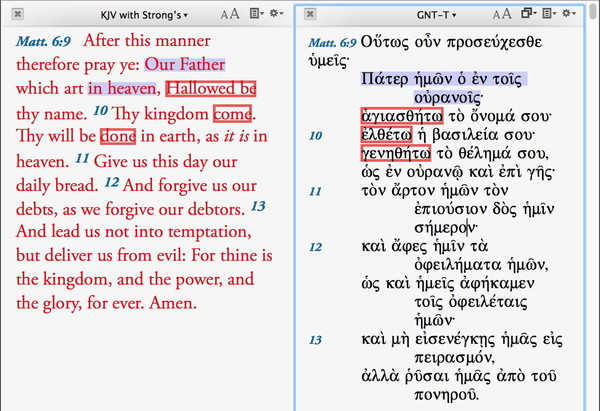Some time ago I was talking with a woman who said she likes to think of the Lord’s prayer differently than it is traditionally recited. She enthusiastically explained that if you just understand the sentence structure a little differently, Jesus’s prayer in Matthew 6:9-13 takes on a whole new meaning. Here, as best as I can remember, is how she likes to divide the text:
Our Father which art
In heaven hallowed be
Thy name thy kingdom
Come thy will
Be done in earth as it is in heaven
Give us this day our daily bread
And forgive us our debts, as we forgive our debtors.
And lead us
not into temptation, but deliver us from evil:
For thine is the kingdom, and the power, and the glory, for ever. Amen.
By rearranging the text in this way, this woman “discovered” all kinds of new insights. For example, praying “Our Father which art” enabled her to focus on God’s existence, and reminded her of God describing himself as “I AM” in Exodus 3:14. As I listened to her explanation, I had two thoughts.
On the one hand, I know that the original Greek text did not include punctuation. That was added later, and it is perfectly reasonable to debate how the text should be divided into sentences, clauses, and phrases. For example, one place where I think a simple punctuation change does clarify the text is in Romans 8:33-34. I think the statements “It is God who justifies” and “Christ Jesus is the one who died” are better read as rhetorical questions: “God who justifies?” and “Christ Jesus who died?” Reading the text that way improves the flow of the passage, which is essentially a series of rhetorical questions designed to drive home Paul’s point. Knowing this, I was not willing to dismiss this woman’s suggestion until I had a chance to look at the Greek.
That, of course, was my second thought: “What does the Greek say?” I was pretty sure that the King James Bible’s “which art” was simply supplied by the translators and did not reflect any actual emphasis on God’s existence, but I couldn’t be certain until I had a chance to fire up Accordance. Sure enough, the Greek of Matthew 6:9 reads “Our Father in heaven.” There is nothing in the Greek that emphasizes God’s being or existence—“which art” was simply supplied by the KJV translators. Furthermore, the beginning of the first three petitions is clearly indicated by the presence of a third-person imperative. There is more variation in the structure of the later petitions, but the traditional division is still pretty clearly vindicated.
In a day and age when many people question the value of learning Hebrew and Greek, situations like this underscore the importance of at least a cursory understanding of the languages. Good exegesis is constrained by the text itself. If our interpretations are not supported by the text as it is written, then we know we need to adjust our interpretations.
Yes, much exegesis can be done using a good English translation. In fact, I’ve even argued that it is better to be able to read English well than to know Greek and Hebrew. Nevertheless, the text which we are ultimately exegeting is the original text written in Hebrew and Greek, and there are some interpretive questions which simply cannot be answered unless we ask, “What does the Greek (or Hebrew) say?”
Accordance provides many tools for exploring and analyzing the original Greek and Hebrew texts of the Bible, from English Bibles tagged with Strong’s numbers to high end features designed for language experts. With Accordance, it’s easy for anyone to find out what the Greek or Hebrew says.


